Character history
Magnolia and Gaylord fall in love and marry after a whirlwind courtship, and here again the novel and the musical differ.
In the novel, they stay on the boat until shortly after the accidental drowning of Cap'n Andy during a storm. Because of the incessant nagging of Magnolia's mother, Parthy, they leave the boat with their baby daughter and move to Chicago, where they live off Gaylord's gambling earnings. They are alternately rich and poor, and Gaylord is occasionally unfaithful to his wife and belittles her. Years later, upon hearing that Parthy is coming to visit, and finding himself broke, he borrows money from the local whorehouse madam and returns, completely drunk, to the boarding house at which they are living. As he sleeps, Magnolia goes to the whorehouse to return the money, is horrified and saddened to discover that her old friend Julie is working as a secretary there, and comes back to the boarding house to discover that Ravenal has abandoned her (Magnolia). He never returns, and Magnolia brings up their daughter alone. Ravenal eventually dies under unexplained circumstances, in San Francisco. Years later, after Parthy dies, Magnolia returns to Mississippi to manage the show boat and gives her daughter all of Parthy's inheritance money.
In the musical, Gaylord Ravenal is a much more sympathetic character. None of the characters in the story die in the musical, and Gaylord remains faithful to Magnolia. The pair moves to Chicago with their daughter, as in the novel, but not because of Parthy's nagging. Rather, Gaylord wants to show Magnolia the big city. He deserts her after ten years, not because he fears the wrath of Parthy, but because he feels guilty over his gambling losses and his inability to support Magnolia. She gets a job as a nightclub singer (this is made possible by Julie, who, now an alcoholic, secretly quits her job so that Magnolia can have it). Magnolia then goes on to become a Broadway star, with the encouragement of her father, Cap'n Andy, all the while raising her daughter alone. Twenty-three years later, when Magnolia retires and she and her now adult daughter (now a Broadway star herself) return to the boat for a family reunion, Gaylord is there waiting. He and Magnolia reconcile, and all is well.

Carousel is the second musical by the team of Richard Rodgers (music) and Oscar Hammerstein II. The 1945 work was adapted from Ferenc Molnár's 1909 play Liliom, transplanting its Budapest setting to the Maine coastline. The story revolves around carousel barker Billy Bigelow, whose romance with millworker Julie Jordan comes at the price of both their jobs. He participates in a robbery to provide for Julie and their unborn child; after it goes tragically wrong, he is given a chance to make things right. A secondary plot line deals with millworker Carrie Pipperidge and her romance with ambitious fisherman Enoch Snow. The show includes the well-known songs "If I Loved You", "June Is Bustin' Out All Over" and "You'll Never Walk Alone". Richard Rodgers later wrote that Carousel was his favorite of all his musicals.
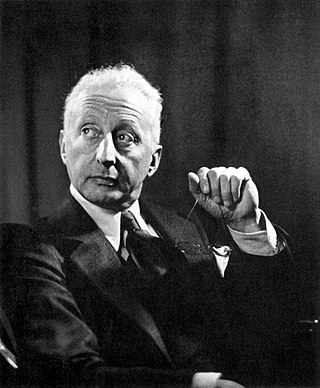
Jerome David Kern was an American composer of musical theatre and popular music. One of the most important American theatre composers of the early 20th century, he wrote more than 700 songs, used in over 100 stage works, including such classics as "Ol' Man River", "Can't Help Lovin' Dat Man", "A Fine Romance", "Smoke Gets in Your Eyes", "The Song Is You", "All the Things You Are", "The Way You Look Tonight" and "Long Ago ". He collaborated with many of the leading librettists and lyricists of his era, including George Grossmith Jr., Guy Bolton, P. G. Wodehouse, Otto Harbach, Oscar Hammerstein II, Dorothy Fields, Johnny Mercer, Ira Gershwin and Yip Harburg.

Rodgers and Hammerstein was a theater-writing team of composer Richard Rodgers (1902–1979) and lyricist-dramatist Oscar Hammerstein II (1895–1960), who together created a series of innovative and influential American musicals. Their musical theater writing partnership has been called the greatest of the 20th century.
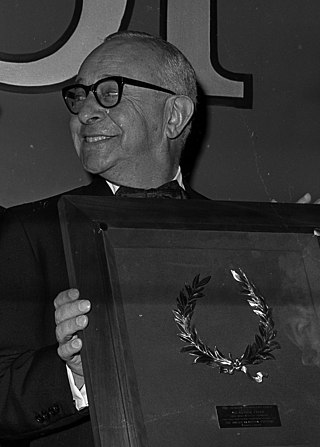
Arthur Freed was an American lyricist and a Hollywood film producer. He won the Academy Award for Best Picture twice, in 1951 for An American in Paris and in 1958 for Gigi. Both films were musicals, and both were directed by Vincente Minnelli. In addition, he produced the film Singin' in the Rain, the soundtrack for which primarily consisted of songs he co-wrote earlier in his career.
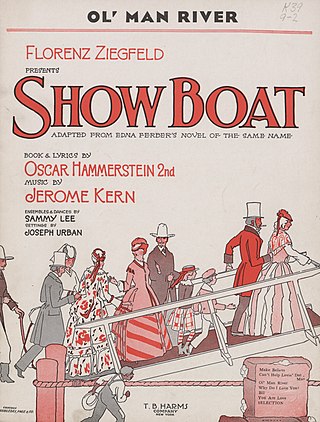
Show Boat is a musical with music by Jerome Kern and book and lyrics by Oscar Hammerstein II. It is based on Edna Ferber's best-selling 1926 novel of the same name. The musical follows the lives of the performers, stagehands and dock workers on the Cotton Blossom, a Mississippi River show boat, over 40 years from 1887 to 1927. Its themes include racial prejudice and tragic, enduring love. The musical contributed such classic songs as "Ol' Man River", "Make Believe", and "Can't Help Lovin' Dat Man".

Helen Morgan was an American singer and actress who worked in films and on the stage. A quintessential torch singer, she made a big splash in the Chicago club scene in the 1920s. She starred as Julie LaVerne in the original Broadway production of Hammerstein and Kern's musical Show Boat in 1927, as well as in the 1932 Broadway revival of the musical, and appeared in two film adaptations, a part-talkie made in 1929 and a full-sound version made in 1936, becoming firmly associated with the role. She suffered from bouts of alcoholism, and despite her notable success in the title role of another Hammerstein and Kern's Broadway musical, Sweet Adeline (1929), her stage career was relatively short. Helen Morgan died of cirrhosis of the liver at the age of 41. She was portrayed by Polly Bergen in the Playhouse 90 drama The Helen Morgan Story and by Ann Blyth in the 1957 biopic based on the television drama.
Show Boat is a 1936 American romantic musical film directed by James Whale, based on the 1927 musical of the same name by Jerome Kern and Oscar Hammerstein II, which in turn was adapted from the 1926 novel of the same name by Edna Ferber.

Till The Clouds Roll By is a 1946 American Technicolor musical film produced by Metro-Goldwyn-Mayer and a fictionalized biopic of composer Jerome Kern, portrayed by Robert Walker. Kern was involved with the production, but died before its completion. It was the first in a series of MGM biopics about Broadway composers.

Show Boat is a 1929 American pre-Code sound part-talkie romantic drama film based on the 1926 novel Show Boat by Edna Ferber. The film initially did not use the 1927 stage musical of the same name as a source, but scenes were later added into the film incorporating two of the songs from the musical as well as other songs. Many of these songs from the stage show were featured in a special prologue that was added to the picture before it was released. This film was produced and released by Universal. Like the majority of films during the early sound era, a silent version was made for movie theatres that had not yet converted to sound.
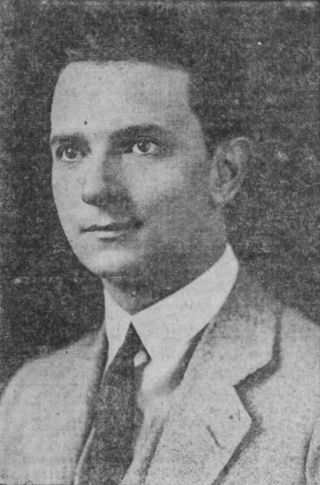
Howard Warren Marsh was a leading Broadway tenor of the 1920s.
"Can't Help Lovin' Dat Man" with music by Jerome Kern, and lyrics by Oscar Hammerstein II, is one of the most famous songs from their classic 1927 musical play Show Boat, adapted from Edna Ferber's 1926 novel.
Julie Dozier is a character in Edna Ferber's 1926 novel Show Boat. In the Jerome Kern and Oscar Hammerstein II's classic musical version of it, which opened on Broadway on December 27, 1927, her stage name is Julie La Verne. She is exposed as Julie Dozier in Act I. In Act II, Julie has changed her name, this time to Julie Wendel.

Show Boat is a 1951 American musical romantic drama film, based on the 1927 stage musical of the same name by Jerome Kern (music) and Oscar Hammerstein II, and the 1926 novel by Edna Ferber. It was made by MGM, adapted for the screen by John Lee Mahin, produced by Arthur Freed and directed by George Sidney.

Show Boat is a 1926 novel by American author and dramatist Edna Ferber. It chronicles the lives of three generations of performers on the Cotton Blossom, a floating theater on a steamboat that travels between small towns along the banks of the Mississippi River, from the 1880s to the 1920s. The story moves from the Reconstruction Era riverboat to Gilded Age Chicago to Roaring Twenties New York, and finally returns to the Mississippi River.
Mis'ry's Comin' Aroun' is a once-neglected song from the 1927 musical Show Boat by Jerome Kern and Oscar Hammerstein II. It was cut from the production during the Washington D.C. tryout on the orders of producer Florenz Ziegfeld, supposedly because it was one of the factors that made the show too long. However, musical theatre historian Miles Kreuger and conductor John McGlinn, also suggest that it was the dark, dramatic tone of the piece that most concerned Ziegfeld. Kern was reportedly so incensed by the deletion of "Mis'ry's Comin' Aroun'" that he made it the principal motif of Show Boats original overture and asked orchestrator Robert Russell Bennett to work sections of it into the background music as well, where it is now played by the orchestra during some of the dialogue scenes involving the mixed race actress Julie La Verne.
"Bill" is a song heard in Act II of Kern and Hammerstein's classic 1927 musical, Show Boat. The song was written by Kern and P. G. Wodehouse for their 1917 musical Oh, Lady! Lady!! for Vivienne Segal to perform, but it was withdrawn because it was considered too melancholy for that show. When Kern and Hammerstein were at work on a serious and somewhat tragic production of Show Boat, however, they decided that the song would be perfect for a nightclub scene in that show. Hammerstein revised Wodehouse's original lyrics somewhat, and the song was given to real-life nightclub singer Helen Morgan to sing as she portrayed the mulatto Julie in that version of Show Boat.
"Make Believe" is a show tune from the 1927 Broadway musical Show Boat with music by Jerome Kern and lyrics by Oscar Hammerstein II.
"You Are Love" is a song by Jerome Kern and Oscar Hammerstein II from their classic 1927 musical play Show Boat. It is sung twice in the show - first, by Magnolia Hawks, the heroine, and riverboat gambler Gaylord Ravenal when they agree to marry near the end of Act I, and again in the penultimate scene of Act II by Ravenal when he returns to Magnolia after having deserted her for 23 years.

Maxwell House Show Boat was the top radio show in the United States from 1933 to 1935. The program was sponsored by Maxwell House coffee, and it aired on NBC Radio Thursday nights, 9 pm. The first show was broadcast on Thursday, June 15, 1933.
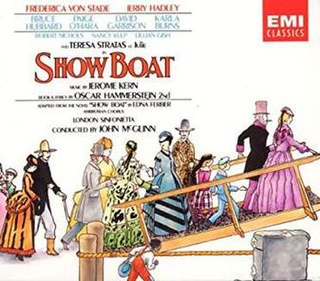
Show Boat is a 221-minute studio album of Jerome Kern's musical, performed by a cast headed by Karla Burns, Jerry Hadley, Bruce Hubbard, Frederica von Stade and Teresa Stratas with the Ambrosian Chorus and the London Sinfonietta under the direction of John McGlinn. It was recorded from June 1 to August 31, 1987 at Abbey Road Studios in London.












